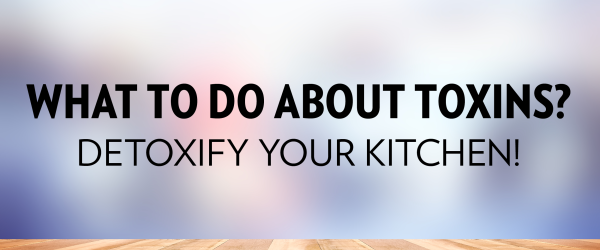BLOG
The best place to start dealing with toxins is to reduce your exposure to toxins. Do what you can. In the kitchen the more important things are as follows:
• Make environmentally friendly choices especially with cleaning products. Chemical antibacterial products are generally not a good idea. Bicarbonate of soda and vinegar are great cleaning products. • Avoid Teflon or similar non-stick pans and cooking utensils. Don't use aluminium or copper pans. Use safe iron, stainless steel or ceramic pots and pans instead. • Avoid heating food in plastic or in plastic bags. Heat food in the microwave in glass or ceramic. Some chemicals used in plastic cause hormonal disruptions. Balanced hormones are vital to health. • Avoid tinned food as the tins are lined with plastic and are heated in the canning process. • Use glass jars for storage. Keep your drinking water in a glass jug or bottle. • If your dishes are old, make sure there isn't lead or other toxins in their glazing. • Check that your water is free from lead, copper and plastic from the pipes. Do what you can to purify. Some say adding 2 grains of sea-salt to a cup of water does wonders for the purity of the water. • Eat organic foods as much as possible. This includes fruits, vegetables, grains, sugar, meats, fish,... everything. Flour included! • Soak non-organic fruits and vegetables in cold water (can add a bit of apple cider vinegar to the water) for 15 minutes or so before eating or cooking. • Soak your rice long, even overnight if you can. Cook your rice in a lot of water and drain off the excess just before it is finished. There growing evidence that there is far greater than acceptable amounts of arsenic in rice. Arsenic can cause neurological problems. • Avoid products with rice based ingredients for the previous reason. Make your baby's rice porridge from scratch from well-soaked rice. • Rotate your foods so you are not consuming the same thing each day. This helps to prevent specific toxin build-ups from the same foods. • Check which fish can be safely eaten. Don't eat excessive amounts of fish known to carry toxins. In general, toxic fish includes tuna, farmed salmon, sea trout, sea bass, catfish, swordfish, shark, tilefish, broadbill, marlin, king mackeral, and orange roughy and fish from polluted lakes, rivers and inner coastal regions such as in the inner ends of fjords, . The main concern here is with mercury and PCBs. • Rinse your dishes well from soap. Diswashing soap's function is to break down fats. Your stomach lining is protected by fat cells and you want these to stay intact. Clean your dishwater from any caked-up soap. Let the steam out of your dishwasher at the end of the cycle. Keep you dishwater clear of soap by running it on a cycle by itself with a cup of vinegar once a month. • Cut your dishwasher soap tab in two or dose with ½ the amount of powder you normally use. Most of the time this ½ dose is more than enough especially if you rinse your dishes first. This is better for you and the lakes, rivers and oceans we all drink from.

